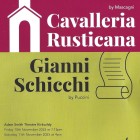Cavalleria Rusticana 2023Fife Opera
Read more about the opera Cavalleria Rusticana
Fife Opera's excellent full-scale performances have been sadly missed while the Adam Smith Theatre was closed for renovation. They now return at full throttle with a double bill of popular favourites Cavalleria Rusticana and Gianni Schicchi. The Theatre is only a few yards from both railway and bus stations, so access is easy for travellers, especially for the Saturday matinee (this time a 4pm start permitting a very long lunch, if necessary).
A surprise came with the order of play. Usually one might expect the longer and more serious opera to start proceedings, with the short fire-cracker comedy to follow. The fact that the position was reversed was unusual. Assessment of Mascagni's first hit usually depends on the comparative quality of performance of it and its usual partner, Pagliacci. With the latter generally played second it has often had the advantage.
Here the benefit was undoubtedly felt by Cavalleria. Gianni Schicchi is no longer the rarity it used to be, and it is only a few months since Scottish Opera launched its wonderful production of the full Trittico, recently deservedly shortlisted for an International Opera Award. Cavalleria suffered no such competition.
Young director Eleanor Felton had the bright idea of basing her concept on a recognisable setting - Kirkcaldy town centre next Easter, 2024. The set was simple, with a large celtic cross in the centre, within a group of stone benches. The characters were dressed probably as they appeared during the weeks of rehearsal. There was one rough-sleeper, complete with bottle, and a handful of loitering teenagers, one with a skateboard. Santuzza uses her pregnancy test kit to inform a stunned Turiddu of the situation.
As with all updated productions, some things jarred. Alfio still sang cheerfully of his wagon and horses, so anyone reading the programme note beforehand would be puzzled to read that he now worked on the railways. And is ear-biting still a feature of life among the adult, or adolescent, males of the burgh? Never mind. This second performance, a Saturday matinee, was put across with real conviction. Not generally a fan of mimed action during overtures or interludes, I have to admit to being won over by the famous Intermezzo. This was treated as a dream sequence, with Santuzza imagining a reconciliation with Turiddu, who was overjoyed at the coming event. This was highly effective, almost a pas de deux.
Alistair Digges conducted an excellently paced performance with a band of 24 players using Tony Burke's attractive reduction. It was good to see that Fife Opera's chorus has survived the pandemic with some young voices appearing - and no wobbly sopranos during the Easter Hymn. Russell Malcolm, the Alfio, now has many years of experience in a multitude of roles, and he was in excellent voice.
The three women were all new to the company, and all students in Glasgow. Virginia Lafean is a highly promising young American soprano. Her Santuzza was more gentle than some, quickly regretting her action long before the final tragedy. Elizabeth Clarence didn't try to play Mamma Lucia as artificially aged, so perhaps she did seem too young compared with her son, but better that than an overdone 'old crone' make-up and walk. Aixin He made an effective debut as Lola.
The most consistently fine performance of the show was tenor Ian McBain's appearance as Turiddu. Before Covid he was a very effective figure in several leading roles. He was equally good this time round, though his voice has now developed considerably more power and a much darker but highly attractive tone quality than before. He is also an excellent actor, with a relaxed style of movement. The only sequence that was less than ideal was his openiing off-stage Serenade - perhaps just not placed ideally to project.
This performance was greeted with joy by a good-sized audience, no doubt delighted to be back in their excellent theatre.
Performance Cast
- Turiddu a young soldier
- Santuzza a village girl
-
Fiona Galloway (Nov 10)
Virginia Lafean (Nov 11)
- Mamma Lucia the innkeeper, Turiddu’s mother
-
Susan Crosby (Nov 10)
Elizabeth Clarence (Nov 11)
- Alfio the village carter
- Lola Alfio’s wife
